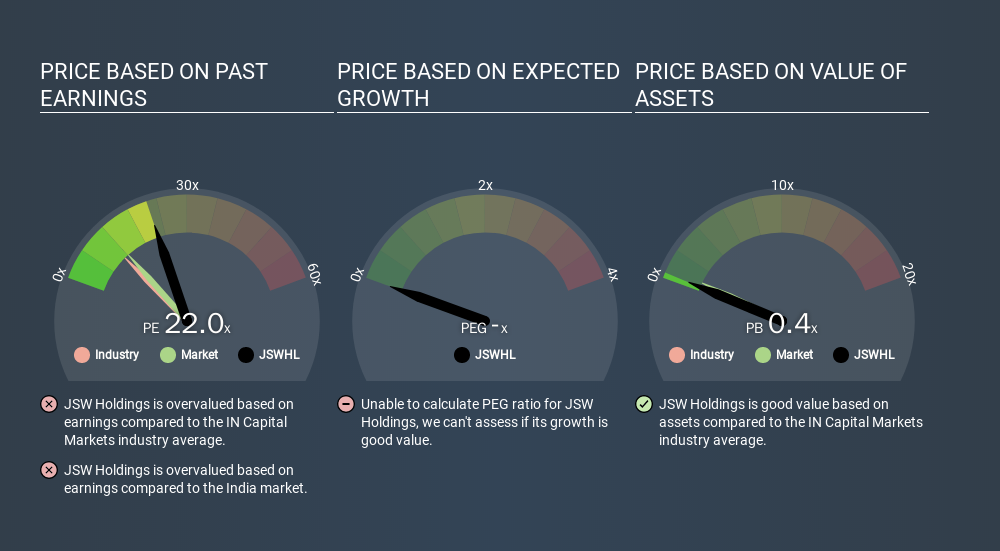- India
- /
- Diversified Financial
- /
- NSEI:JSWHL
Should You Be Tempted To Sell JSW Holdings Limited (NSE:JSWHL) Because Of Its P/E Ratio?

Today, we'll introduce the concept of the P/E ratio for those who are learning about investing. To keep it practical, we'll show how JSW Holdings Limited's (NSE:JSWHL) P/E ratio could help you assess the value on offer. Based on the last twelve months, JSW Holdings's P/E ratio is 21.97. That corresponds to an earnings yield of approximately 4.6%.
See our latest analysis for JSW Holdings
How Do I Calculate JSW Holdings's Price To Earnings Ratio?
The formula for P/E is:
Price to Earnings Ratio = Price per Share ÷ Earnings per Share (EPS)
Or for JSW Holdings:
P/E of 21.97 = ₹2184.350 ÷ ₹99.422 (Based on the trailing twelve months to December 2019.)
(Note: the above calculation results may not be precise due to rounding.)
Is A High Price-to-Earnings Ratio Good?
The higher the P/E ratio, the higher the price tag of a business, relative to its trailing earnings. All else being equal, it's better to pay a low price -- but as Warren Buffett said, 'It's far better to buy a wonderful company at a fair price than a fair company at a wonderful price'.
How Does JSW Holdings's P/E Ratio Compare To Its Peers?
One good way to get a quick read on what market participants expect of a company is to look at its P/E ratio. The image below shows that JSW Holdings has a higher P/E than the average (10.9) P/E for companies in the capital markets industry.

JSW Holdings's P/E tells us that market participants think the company will perform better than its industry peers, going forward. The market is optimistic about the future, but that doesn't guarantee future growth. So investors should delve deeper. I like to check if company insiders have been buying or selling.
How Growth Rates Impact P/E Ratios
P/E ratios primarily reflect market expectations around earnings growth rates. Earnings growth means that in the future the 'E' will be higher. That means even if the current P/E is high, it will reduce over time if the share price stays flat. And as that P/E ratio drops, the company will look cheap, unless its share price increases.
JSW Holdings increased earnings per share by an impressive 19% over the last twelve months. And earnings per share have improved by 24% annually, over the last five years. So one might expect an above average P/E ratio.
A Limitation: P/E Ratios Ignore Debt and Cash In The Bank
Don't forget that the P/E ratio considers market capitalization. Thus, the metric does not reflect cash or debt held by the company. The exact same company would hypothetically deserve a higher P/E ratio if it had a strong balance sheet, than if it had a weak one with lots of debt, because a cashed up company can spend on growth.
Such spending might be good or bad, overall, but the key point here is that you need to look at debt to understand the P/E ratio in context.
JSW Holdings's Balance Sheet
JSW Holdings has net cash of ₹352m. That should lead to a higher P/E than if it did have debt, because its strong balance sheets gives it more options.
The Verdict On JSW Holdings's P/E Ratio
JSW Holdings has a P/E of 22.0. That's higher than the average in its market, which is 12.2. Its strong balance sheet gives the company plenty of resources for extra growth, and it has already proven it can grow. So it does not seem strange that the P/E is above average.
Investors should be looking to buy stocks that the market is wrong about. People often underestimate remarkable growth -- so investors can make money when fast growth is not fully appreciated. Although we don't have analyst forecasts you could get a better understanding of its growth by checking out this more detailed historical graph of earnings, revenue and cash flow.
Of course, you might find a fantastic investment by looking at a few good candidates. So take a peek at this free list of companies with modest (or no) debt, trading on a P/E below 20.
If you spot an error that warrants correction, please contact the editor at editorial-team@simplywallst.com. This article by Simply Wall St is general in nature. It does not constitute a recommendation to buy or sell any stock, and does not take account of your objectives, or your financial situation. Simply Wall St has no position in the stocks mentioned.
We aim to bring you long-term focused research analysis driven by fundamental data. Note that our analysis may not factor in the latest price-sensitive company announcements or qualitative material. Thank you for reading.
About NSEI:JSWHL
JSW Holdings
A non-banking financial company, primarily engages in investing and financing activities in India.
Excellent balance sheet with proven track record.
Market Insights
Community Narratives





